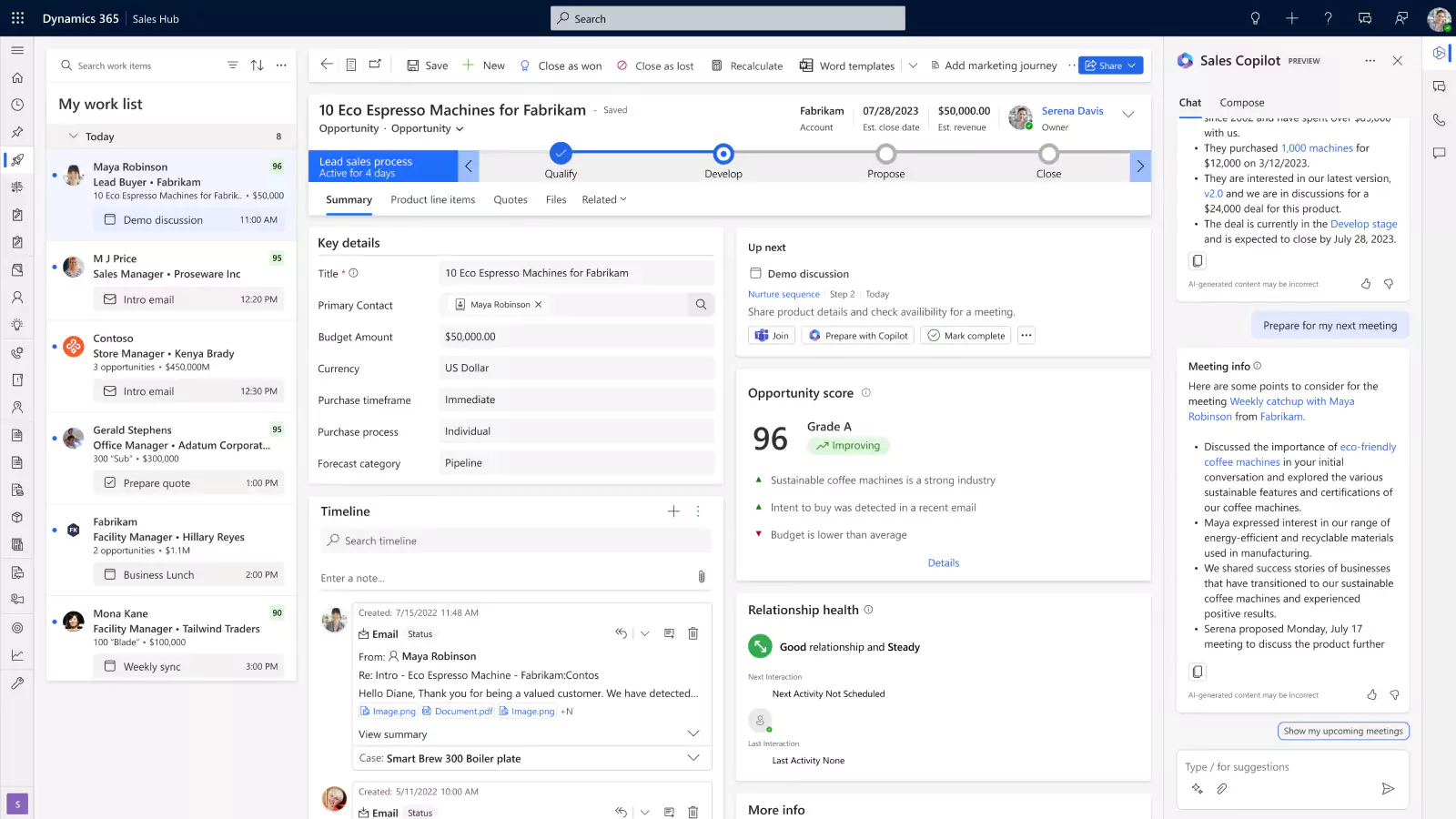Salesforce vs Dynamics 365: Choosing the right CRM for your needs

Selecting the right customer relationship management (CRM) system is a critical decision that can drive organizational growth. In the realm of CRM software, Salesforce and Dynamics 365 stand out as leading contenders, each offering distinct advantages and capabilities. Salesforce is a well-known CRM that is highly customizable and ideal for smaller companies due to its rising costs, whereas Dynamics 365 includes both CRM and ERP capabilities along with AI integration, making it suitable for companies of all sizes, particularly those leveraging Microsoft 365.
In this blog, we will explore the key differences between Salesforce vs Dynamics 365 to help you make an informed choice for your organization.
What is Salesforce?
Salesforce is a widely used CRM solution that provides a comprehensive suite of tools and services designed to help businesses build and maintain stronger relationships with their customers. Salesforce is known for its accessibility and user-friendly interface, making it appealing to businesses. Its low starting point makes it particularly attractive to smaller companies, offering a cost-effective entry into CRM. However, this affordability comes with limitations, as the basic packages provide only limited functionality. As businesses grow, the cost of Salesforce increases significantly, potentially outweighing its initial affordability.
One of Salesforce’s strengths lies in its robust feature set, covering essential sales, marketing, and customer service operations. Furthermore, while Salesforce offers a high level of customization, many companies fall into the trap of over-customization, leading to complexities and increased management overhead as they scale. Thus, while Salesforce offers powerful tools for managing customer relationships, careful consideration of long-term scalability and cost implications is necessary to maximize its benefits.
What is Dynamics 365?
Dynamics 365 is a versatile suite of business applications offered by Microsoft, encompassing both CRM and ERP functionalities. It serves as a unified platform to streamline various aspects of business operations, including sales, marketing, customer service, finance, supply chain management, and more. It leverages the power of the Microsoft ecosystem, seamlessly integrating with other Microsoft products such as Office 365, Power BI, and Azure, to provide a cohesive and interconnected platform for organizations.
Dynamics 365 provides modular applications that can be tailored to fit specific business requirements, enabling organizations to build a customized solution that evolves with their changing needs. Within its suite of applications, Dynamics 365 offers a range of CRM apps, including Dynamics 365 Sales, Dynamics 365 Customer Service, Dynamics 365 Customer Insights (formerly Dynamics 365 Marketing), and Dynamics 365 Field Service. Additionally, the ERP applications include Dynamics 365 Business Central, Dynamics 365 Finance, Dynamics 365 Supply Chain Management, and Dynamics 365 Project Operations. This comprehensive range of applications positions Dynamics 365 as a leading solution for organizations seeking to enhance productivity, drive growth, and achieve success in the digital age.
Dynamics 365 also stands out for its AI-driven insights and analytics capabilities. Dynamics 365 Copilot, Microsoft’s AI-powered tool, is designed to boost productivity across various business segments and is available within all Dynamics 365 subscriptions. Harnessing the potential of artificial intelligence and machine learning, Dynamics 365 Copilot provides actionable insights and predictive analytics to assist businesses in making informed decisions and achieving better outcomes. Whether it’s sales forecasting or customer segmentation, Dynamics 365 empowers organizations to maximize the value of their data, gaining a competitive advantage in today’s dynamic business environment.
Key differences between Salesforce and Dynamics 365
Understanding the differences between Salesforce and Dynamics 365 is crucial for organizations seeking the right CRM solution. One of the most significant differences between Salesforce and Dynamics 365 lies in their integration with other software ecosystems. Dynamics 365 is deeply ingrained within the Microsoft stack, seamlessly integrating with Microsoft 365. This native integration ensures a smooth flow of data and processes across various Microsoft products, making it an ideal choice for companies heavily invested in the Microsoft ecosystem. On the other hand, Salesforce offers integrations with a wide range of third-party applications but may require additional effort to integrate with Microsoft products.
A notable difference between the two platforms is the inclusion of AI capabilities. Dynamics 365 includes Dynamics 365 Copilot as part of its subscription cost, providing users with AI-driven insights and analytics out-of-the-box. In contrast, Salesforce offers AI functionality primarily as part of its highest-priced solutions or as an add-on for certain versions, potentially adding to the overall cost of of the solution.
When it comes to user interface, both platforms offer modern and intuitive designs. Salesforce’s interface is acclaimed for its sleek and user-friendly layout, appealing to a broad audience. Dynamics 365, meanwhile, adopts a familiar interface for users accustomed to Microsoft products, facilitating a smoother transition and reducing the learning curve for new users. This familiarity can be advantageous for organizations seeking continuity in user experience across their software applications.
The following table provides a concise overview of the primary differences between the two systems.
Why Dynamics 365 is the better choice
When evaluating Salesforce vs Microsoft Dynamics 365, Dynamics 365 presents itself as the superior choice. Its deep and native integrations within the Microsoft ecosystem streamline business processes, consolidating the functionality of ERP and CRM into a unified solution. Dynamics 365 offers a flexible pricing model tailored to accommodate organizations of different sizes and requirements, making it a cost-effective choice. Additionally, its scalability enables growing businesses to expand their usage of products and applications as needed, without facing significant cost constraints.
- Competitive pricing: Dynamics 365 proves to be more cost-effective in the long run compared to Salesforce. As businesses grow and require additional functionality, Salesforce’s pricing can escalate significantly. In contrast, Dynamics 365 offers transparent pricing and flexible subscription plans, ensuring that businesses can scale without incurring significant costs.
- Native integration with Microsoft stack: Dynamics 365 offers seamless integration with the Microsoft ecosystem, including Microsoft 365, Azure, and Power BI. This native integration ensures a smooth flow of data and processes, eliminating the need for complex and costly third-party integrations.
- Comprehensive solution: Unlike Salesforce, which primarily focuses on CRM functionalities, Dynamics 365 encompasses both CRM and ERP modules, offering a wider range of business operations management functionalities. This comprehensive solution enables organizations to streamline workflows, improve collaboration, and achieve greater efficiency across their entire operations.
- AI-driven insights: Dynamics 365 includes Dynamics 365 Copilot, an AI-powered tool that provides actionable insights and predictive analytics, out of the box. This empowers organizations to make data-driven decisions, optimize processes, and drive better outcomes across their operations.
- Scalability and flexibility: With its modular architecture and range of deployment options, Dynamics 365 provides scalability and flexibility to accommodate the evolving needs of businesses of all sizes. Whether it’s adding new users, expanding functionalities, or integrating additional modules, Dynamics 365 offers a scalable solution that grows with your business.
- Familiar user interface: Dynamics 365 offers a familiar user interface for users accustomed to Microsoft products, reducing the learning curve and facilitating a smoother transition. This familiarity enhances user adoption and productivity, ultimately leading to better utilization of the platform’s capabilities.
- Robust security: Microsoft’s commitment to security provides industry-leading features and access controls to safeguard your data.
Choosing Dynamics 365 empowers businesses with a robust, feature-rich solution aligned with long-term growth and objectives. It serves as an investment that delivers immediate benefits while offering the agility to adapt to evolving business requirements.
Unlock the full potential of Dynamics 365 with Rand Group
Rand Group is your trusted implementation partner for Dynamics 365. With our expertise and experience in implementing Microsoft solutions, we ensure a seamless transition to Dynamics 365, enabling you to maximize the benefits of this powerful platform. Our team of skilled professionals works closely with you to understand your unique business needs and objectives, tailoring the implementation process to suit your requirements. From initial planning and configuration to training and ongoing support, we provide comprehensive services to ensure a successful deployment of Dynamics 365.
- Solution evaluation: We assist in identifying internal requirements and help evaluate solutions beyond price, focusing on the value they provide. We help you evaluate and select the best solutions for your needs, whether it’s the right Dynamics 365 app or a combination of apps, ensuring you get the most value out of your investment.
- Customized solutions: We understand that every business is unique, which is why we offer tailored solutions to meet your specific needs and objectives.
- Seamless integration: Our industry experts ensure the selected solution seamlessly integrates with your existing technology stack.
- Ongoing support: Our commitment to customer satisfaction extends beyond the implementation phase. We provide ongoing support and guidance to help you maximize the value of Dynamics 365.
- User adoption: Our team engages your end-users to encourage user adoption, ensuring a successful software implementation.
With a proven track record of successful implementations, Rand Group is your dedicated partner to deliver results that drive your business forward. We believe in building long-term partnerships with our clients, serving as a trusted advisor to support your growth and success with Dynamics 365
Next steps
Salesforce and Dynamics 365 each offer unique features and advantages that cater to different needs and objectives. Whether you are considering a migration from Salesforce to Dynamics 365 or are looking to implement a CRM for the first time, choosing the right solution is crucial for long-term success. At Rand Group, we specialize in guiding businesses through this decision-making process. With our expertise and decades of experience, we can help you navigate the complexities of Salesforce and Dynamics 365. Contact us today to delve deeper into the right solution for your business and set a course for success.







